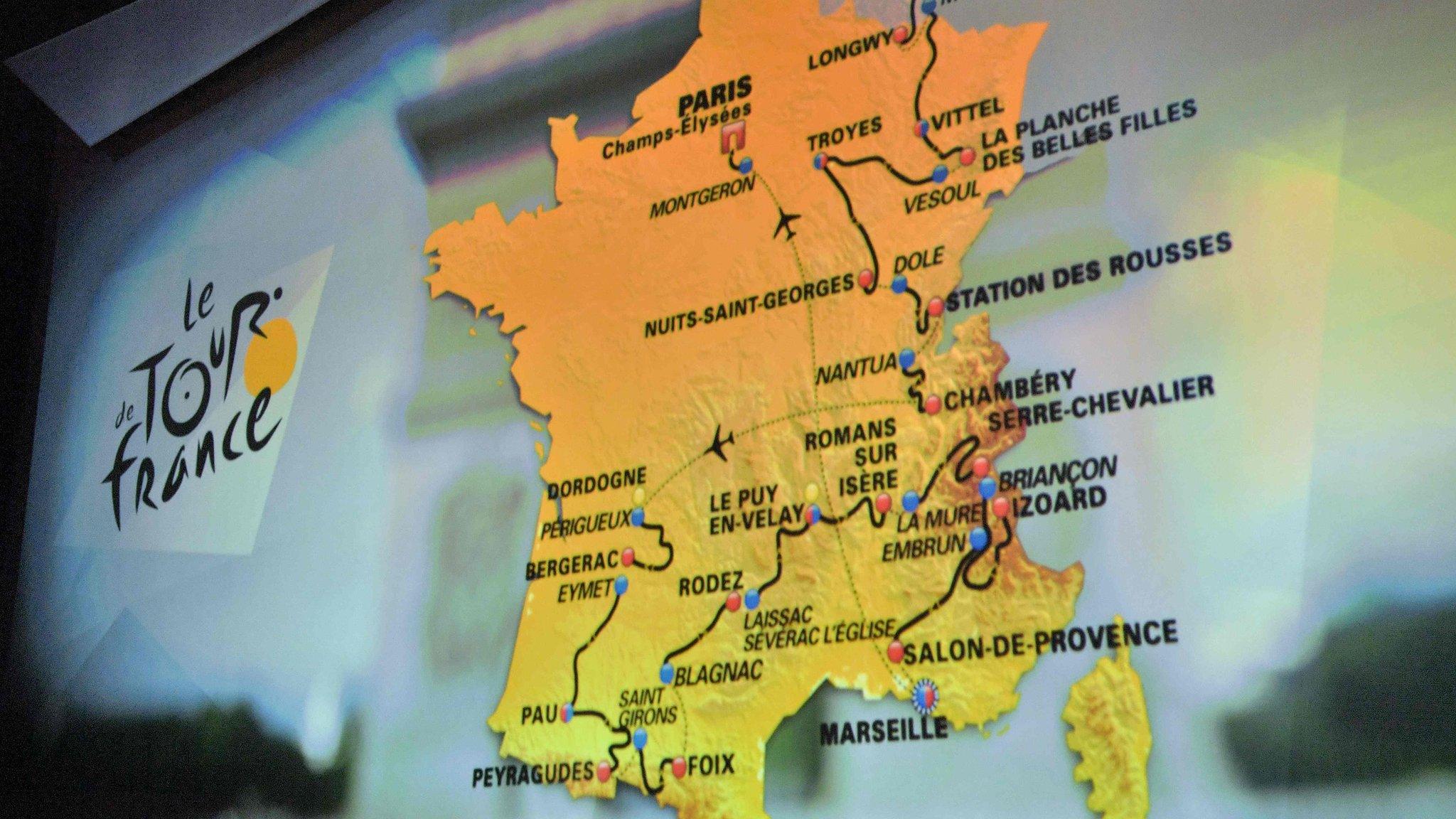Peter Keen: Ex-British Cycling boss says innocent riders risk being tainted
- Published
'Tragedy if innocent riders are tainted'
Peter Keen, the former head of British Cycling, says his greatest fear is the controversy surrounding the sport causing "collateral damage" to Team GB.
Amid a UK Anti-Doping (Ukad) investigation into allegations of wrongdoing in cycling, Keen told BBC Sport it would be an "absolute tragedy" if innocent riders were unfairly tainted.
Keen, credited with masterminding much of the country's success in recent Olympics, said he was "saddened" by the ongoing controversy and there are "lessons to be learned" by British Cycling and Team Sky.
Keen was the architect of British Cycling's world-renowned elite performance programme before becoming director of performance at UK Sport.
In a wide-ranging interview for a special edition of Bespoke on BBC Radio 5 live on Thursday, 20 October at 20:00 BST, he called for:
A "clearer distinction" between British Cycling and Team Sky, adding the relationship between the two bodies was "too close", had "come at a cost" and the "risks are now being laid bare by what is emerging";
An end to sports organisations directly employing doctors, amid growing concern over the use of therapeutic use exemptions (TUEs) for banned substances;
"A better explanation" from Team Sky over the controversy: "It's inconclusive. There are questions that need to be answered."
However, he also pointed out: "I see no evidence that Team Sky have crossed the definitive line that sport has defined as anti-doping infringements."
The background
Team Sky and their former rider Sir Bradley Wiggins, a Tour de France winner, have been criticised over his use of TUEs, which allow athletes to take banned substances for verified medical needs.
Wiggins took anti-inflammatory drug triamcinolone for allergies and respiratory problems shortly before the 2011 and 2012 Tours and the 2013 Giro d'Italia, his TUEs having been approved by the relevant authorities.
Keen says "most people who have experience of high-performance sport in the last decade would acknowledge it is a confusing and difficult area".
He added: "There is a history of the drug that is associated with a performance-enhancement logic.
"The debate that has unfolded was predictable because of that parallel."
Bradley Wiggins: 'This was about putting myself back on a level playing field'
There is no suggestion Wiggins or Team Sky broke any rules, and both deny wrongdoing.
Team Sky boss Sir Dave Brailsford has come under further pressure after refusing to comment on the contents of an alleged medical package, external delivered to France by a British Cycling coach on the day Wiggins won the Criterium du Dauphine in 2011.
'Collateral damage'
Keen, who was replaced by Brailsford at British Cycling in 2003, has now decided to reveal his concerns that the achievements of Team GB cyclists could be unfairly tainted.
"The need now for conclusive explanations and evidence is greater than ever," he said.
"It's collateral damage. When I look at people like Jason Kenny or Dame Sarah Storey, these are stories that are so special because they're about ordinary people who have done extraordinary things.
"I have never sensed anything about them that says that what he have seen isn't the absolute real deal.
"Where there's confusion and doubt about a very high-level performance sport, linked to a programme they are a part of, that's my greatest fear. That whatever's led to this discussion, the wider achievements of people like that are overlooked, and that would be an absolute tragedy.
Sir Dave Brailsford was interviewed by the BBC on 26 September
"I simply cannot see any evidence to suggest that culturally there is anything to fear around the way British Cycling has operated and how those people have achieved."
Keen played a key role in the transformation of the high-performance system at UK Sport, devising the 'no compromise' approach and overseeing the National Lottery funding that helped turn Britain into a sporting superpower.
"What has been achieved in British sport is what it is. It's what we said it was. To have that in itself challenged because of what we have, a confused and emerging picture that focuses on a few individuals, I find it troubling."
"We are not at the end of the story. The stakes are very high... the credibility of a phenomenal story. It is sad but we mustn't lose sight of what has been achieved and ultimately what lies behind that success."
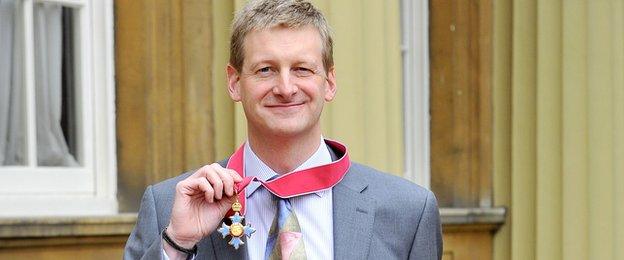
Peter Keen, seen here with his CBE in 2012, was head of British Cycling from 1997 until 2003
Team Sky and British Cycling 'too close'
Since being established in 2010 as the professional offshoot of the governing body's Olympic squad, Team Sky have been closely connected to British Cycling, sharing the national velodrome in Manchester - riders, expertise, coaches and support staff, as well as a sponsor.
Until 2013, UCI president Brian Cookson was president of British Cycling, but also on Team Sky's supervisory board, along with British Cycling chief executive Ian Drake.
Brailsford combined his role as British Cycling performance director and Team Sky principal until April 2014, when he quit the national governing body.
His successor Shane Sutton also performed a dual role before resigning this year over discrimination claims which he denies.
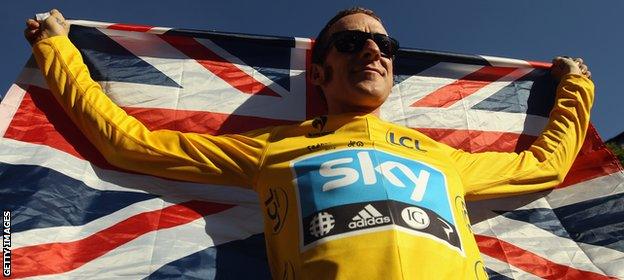
Wiggins was the first British winner of the Tour de France, in 2012
The relationship has been remarkably fruitful, with cycling becoming the country's best-funded and most successful Olympic sport, participation booming, and Team Sky emerging as the dominant global force in road racing, winning the Tour de France four times in the past five years. The velodrome has become known as 'the medal factory'.
But when asked if the two organisations had become too close, Keen said: "Yes. Having a much clearer distinction between the two is important now."
In 2011, a major UK Sport report into the way Team Sky and the Lottery-funded British Olympic team worked together cleared the relationship of any conflicts of interest, but highlighted several areas that needed attention, including joint roles, financial accounting, and transparency.
"There were some profound upsides to British cycling in terms of the more complete support of the brand of Sky, and some extraordinary dreams and memories created from what the individuals and teams have done," said Keen.
"But it has come at a cost, and it's about the blurring of roles and responsibilities. It was a risk and some of those risks are now being laid bare by what is emerging.
"There's almost a potential conflict of loyalty. It does create tensions and it does blur the boundaries."
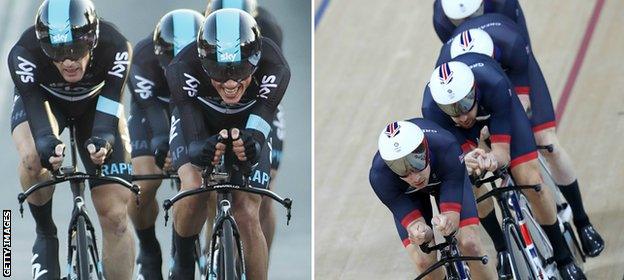
Blurred boundaries - the close workings of Team Sky and the Great Britain team can cause conflicts of interest, according to Keen
Keen said Drake has done "an outstanding job", but that the recent success in the sport has raised serious questions about the governing body.
Keen added: "Undoubtedly through his leadership, mistakes were made. They're uncomfortable and I know it hurts Ian when they're raised.
"But they reflect a whole series of things done with good intention that weren't thought through, and managed as well as they could be, arising from extraordinary levels of success.
"It was all moving so quick. The results have been extraordinary, but some of the underlying mechanisms are clearly not fit for purpose, and that's painful to have to acknowledge because I was part of the journey that led to that.
"If they don't learn lessons and have humility to adapt they will drift away. If they do learn, they will continue to improve."
Should doctors be independent?
The role of former Team Sky doctor Richard Freeman - now at British Cycling - has also come under scrutiny. He signed off Wiggins' TUEs, and allegedly took delivery of the mystery package in June 2011.
Freeman is also alleged by ex-Team Sky rider Jonathan Tiernan-Locke to have "freely" handed out controversial painkiller Tramadol at the 2012 World Championships. Freeman has denied the claim, along with several other GB riders.
Team Sky TUE stance questioned by Jonathan Tiernan-Locke
But with both the UCI and Team Sky reviewing their TUE policies, Keen now wants greater independence when it comes to sports medicine.
He said: "A lot of sport organisations, professional sports and increasingly governing bodies will employ a doctor to look after the health and wellbeing of players and athletes. I am increasingly of the view that is probably not a good thing.
"They probably are going to be able to make a better judgement about where those fine lines now are if they are actually accountable to their peers, from either hospitals, or specialist sports institute environments."
After Cookson said Team Sky may have pushed the TUE rules "to the very limit",, external Keen wants change.
"This is probably one of the more important discussions that needs to come out of what has emerged, particularly around things like TUEs and what is now described as a grey area in prescription medicines," Keen said.
"A lot of the suspicion surrounding such events traces to the possible confusion about the role of sports medicine. That is not to cast aspersions about any individual."
'Team Sky were naive - but no evidence they crossed line'
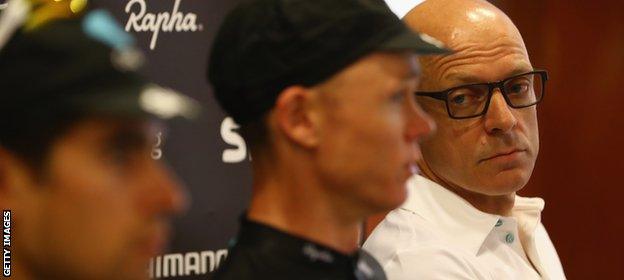
Brailsford (right) has overseen four victories in the Tour de France since becoming head of Team Sky in 2010
Keen also questioned the wisdom of Team Sky's 'zero-tolerance' approach to doping, and their original promises to win clean.
"They were the first to attempt to do something in quite such an overt way like that, to make such a bold statement and to then try and live by it. It's probably proved to be a slightly naive approach," he said.
"They tried to position themselves in a way to the sport and peers that has placed them under unbelievable scrutiny and that's now proving to be a challenge in something as complex as TUEs and medical interventions.
"That's a difficult place for them to be in, but I'm not willing to make a judgement yet.
"I don't see a weight of evidence to suggest Sir Dave Brailsford's role is untenable., external He's clearly a man under pressure, and he's got questions to answer, but that strikes me as a move designed to provoke more controversy, rather than a conclusive end point.
"I see no evidence that they've crossed the definitive line that sport has defined as anti-doping infringements.
"There's an extraordinary team of people that have done a lot of great things there. I imagine Dave will weigh up, as he does with most things, the balance between what's gone right and not gone right."
Keen says he was amazed by Team GB's second place in the medal table at the Rio 2016 Olympics, with cyclists winning six golds, and that nothing should detract from that achievement.
"If you would have asked me even 10 years ago, could I imagine the UK being in front of China, I would have seen it as completely inconceivable.
"That is an extraordinary outcome. What we saw was a culture of excellence. What British Cycling has built is sustainable and positive."
- Published19 October 2016
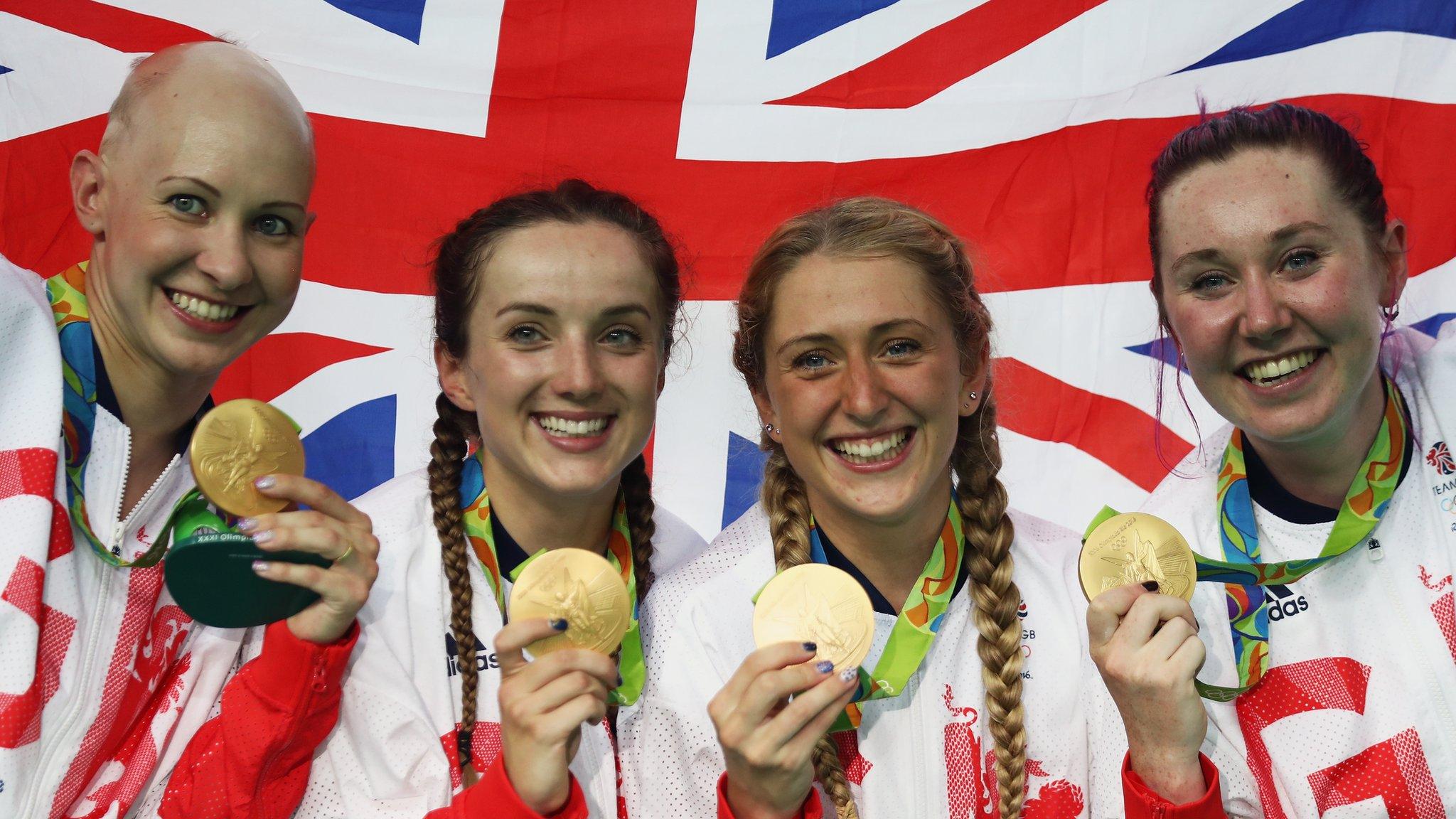
- Published18 October 2016
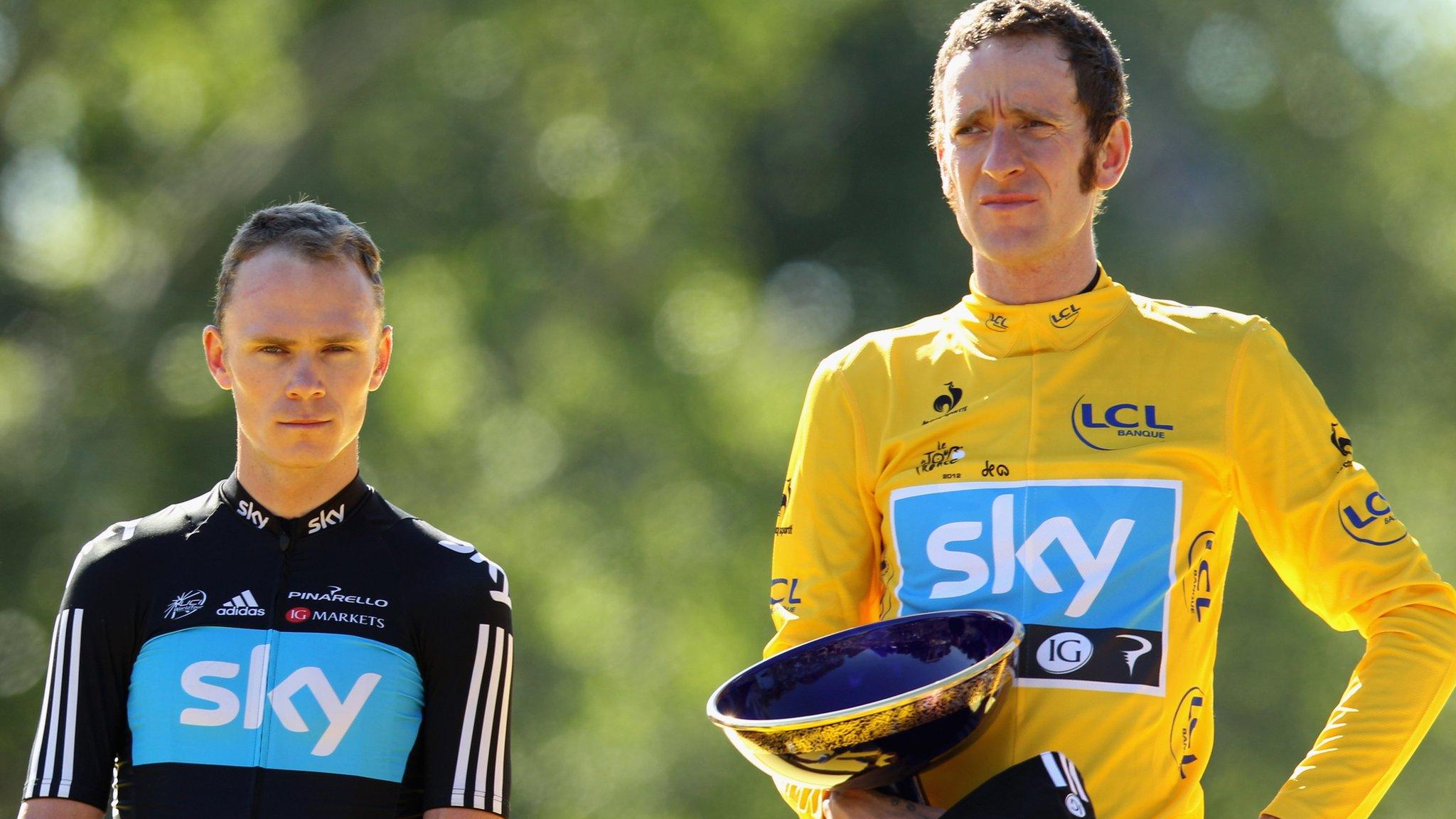
- Published18 October 2016
